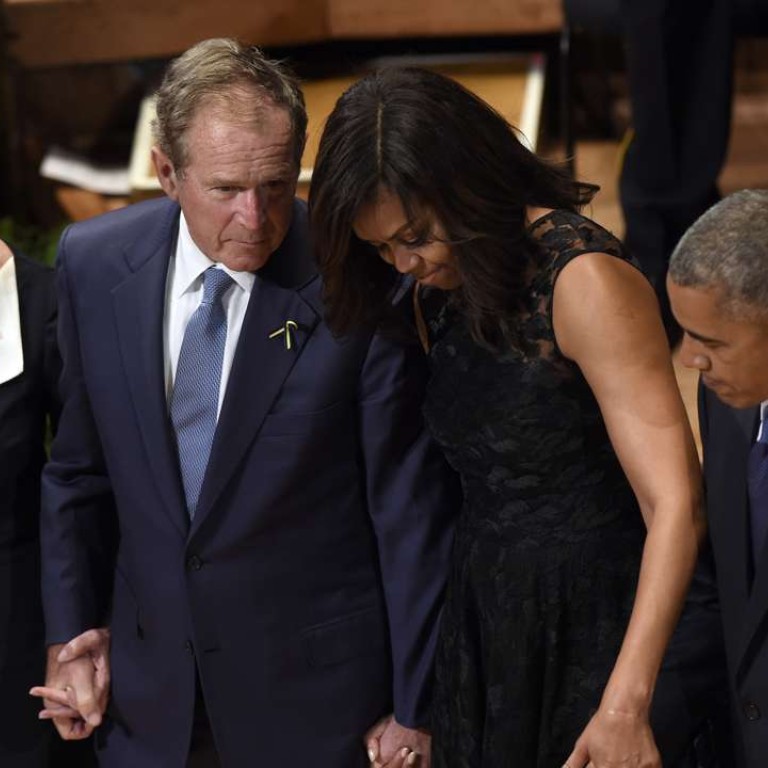
Obama hails fallen Dallas cops as heroes, but many officers feel frayed relationship with president
After each fatal shooting of a black man by a police officer, US President Barack Obama has swiftly spoken out against bad policing, giving voice to the generations of African-Americans who have found themselves at the wrong end of a baton, a snarling dog or a gun.
As much as those words have comforted blacks, they have rankled many of the nation’s men and women in blue. Some have described the remarks as an insult, an all-too-quick condemnation before all the facts are in and a failure to acknowledge the thousands of cops who do a good job and routinely risk their lives.
“It would just be nice for him to say ‘Hey, I support what you’re doing,’” said Scott Hughes, chief of police in Hamilton Township, a suburb of Cincinnati, Ohio. “The president doesn’t defend the police. It’s very one-sided.”
On Tuesday, Obama travelled to Dallas to pay tribute to the five officers who were slain by a sniper at a peaceful protest. The president offered perhaps his strongest words yet of support for law enforcement, praising the dead as heroes who died while preserving a constitutional right.

He spoke before an audience that included police officers, relatives of the slain — and five empty seats, each representing a fallen officer. A folded flag and a police hat rested on each chair. The president mentioned the slain officers by name and offered a few personal tidbits about each one.
Calling the attack the act of a “demented” man,“ Obama appealed for Americans to find a way to bridge the divide, noting that black communities often feel maligned and police officers feel underappreciated.
I’m here to insist that we are not as divided as we seem
“I understand how Americans are feeling. But Dallas, I’m here to say we must reject such despair. I’m here to insist that we are not as divided as we seem,” Obama said before launching into a defence of police and the sacrifices they make.
“We mourn fewer people today because of your brave actions,” he said pointing at the audience filled with officers.
But for many in law enforcement, Obama’s words, while welcome, are greeted with suspicion. Does he really believe it and feel it? They point to perceived slights dating back to his first term, and they believe he has helped stoke the flames of hatred for police.
Soon after Obama took office, police said, they sensed they wouldn’t get the same appreciation as shown by his two predecessors, who seemed to have officers’ backs.
Under President Bill Clinton, the Crime Bill of 1994 provided money to hire tens of thousands of new police. The image of President George W. Bush, who also attended the memorial service, gathering with first responders in the rubble of the World Trade Centre also sent a powerful message.
Just seven months into Obama’s first term, Harvard Professor Henry Louis Gates was arrested as he returned home late one night and tried to open his jammed front door. The white officer who responded to a report of a possible break-in arrested him for disorderly conduct.
The incident sparked a debate about racial profiling with Obama saying police had acted “stupidly.”
Pinal County (Arizona) Sheriff Paul Babeu, a longtime Obama critic whose jurisdiction sits between Phoenix and Tucson, said the president has undermined law enforcement throughout his tenure by raising issues of race and casting aspersions about officers in highly publicized police encounters.
The Gates incident also irritated Travis Yates, a major with the Tulsa, Oklahoma, police department and editor of lawofficer.com.
“That really was the tell-tale sign of his ideology” against police, Yates said.
The distrust has only deepened with each police shooting of a black man as they see the president or one of his representatives attend services for the victims. But until Tuesday, they said, the president had not shown that same outpouring whenever an officer has died in the line of duty.
It’s more than just the symbolism that troubles them.
They point to Obama’s opposition to providing police with surplus military equipment, which officers generally believe is essential to ensuring their safety and responding effectively to acts of terror or other mass violence. It feels like Obama isn’t interested in giving them the tools they need to do their jobs and stay safe.
“His policies, time and time again, put officers back on their heels,” Yates said.
For some, the relationship is so frayed that Obama’s words of support for law enforcement ring hollow.
“Maybe it’s not fair because we look at everything he says and think he’s not genuine,” Yates said.

